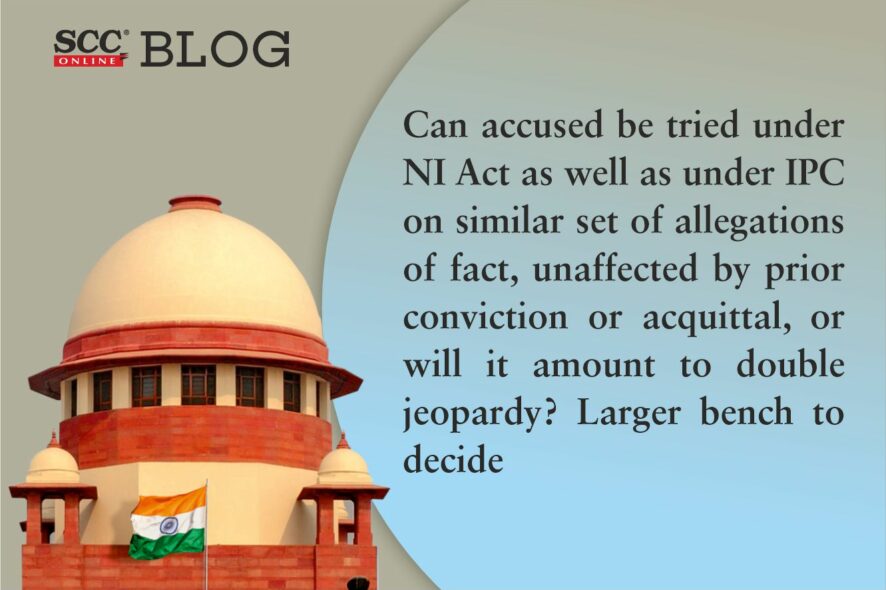Supreme Court: The bench of SA Nazeer and JK Maheshwari*, JJ has called upon a larger bench to decide if on similar set of allegations of fact the accused can be tried for an offence under Negotiable Instruments Act, 1881 which is special enactment and also for offences under IPC unaffected by the prior conviction or acquittal or whether the bar of Section 300(1) Cr.P.C. would attract for such trial.
The Court was hearing a case relating to dishonour of cheque. The appellant had contended that the respondents approached and asked him to invest money for the development of a land and assured that profit shall be divided amongst the appellant and respondents. He, hence, made the investment of a sum of Rs.62,32,754/¬, but neither profit was shared nor any piece of land was given to the appellant.
When he asked to repay the amount, the respondent handed over a cheque for an amount of Rs.87,00,000 in lieu of repayment of principal sum and interest. The said cheque was, however, dishonored, giving rise to a complaint under Section 138 of NI Act.
Later, the respondent no.5 registered the case against respondent no.1 to 4 for the offences under Sections 120B, 406, 420 and 34 of IPC on 01.10.2016, and after investigation, challan was filed before the competent Magistrate on which cognizance was taken by him.
The High Court of Madras for quashment of the aforesaid proceedings taking into consideration that proceedings under Section 138 of the N.I. Act pertaining to the same cause of action and on the same facts and grounds are pending, prior to the registration of the present proceedings.
Before the Supreme Court, the parties relied on Sangeetaben Mahendrabhai Patel v. State of Gujarat, (2012) 7 SCC 621 to contend that in an offence under Section 138 of the NI Act, requirement to prove mens rea is not necessary although for an offence under Section 420 IPC, fraudulent and dishonest intention i.e. mens rea is relevant to prove and hence, it was urged that the quashment of the proceedings for an offence under Sections 420, 406, 120(B) and 34 IPC as directed by the High Court was wholly unjustified
On the other hand, the respondents relied on Kolla Veera Raghav Rao v. Gorantla Venkateswara Rao, (2011) 2 SCC 703 wherein it was held that if the offences are different and the facts are the same, the prosecution under Section 420 of the IPC is barred by virtue of Section 300(1) of the Cr.P.C.
In G. Sagar Suri v. State of UP, (2000) 2 SCC 636, the offences under Section 138 of NI Act as well as the offence under Sections 406 and 420 of IPC were allegedly committed by the accused of that case. After lodging the complaint under Section 138 of NI Act, a petition under Section 482 before the High Court was filed for quashment of the complaint which was dismissed. On filing the special leave petition before the Supreme Court, it was allowed and the Court directed that the prosecution under Sections 420 and 406 is not tenable and quashed.
The Court, in the case at hand, was of the opinion that the aforesaid judgments cited by the respective parties are conflicting, hence, to avoid any further confusion and to maintain consistency, it referred the issue for decision by the larger bench to answer the following questions:
(1) Whether the ratio of the judgment, in the case of G. Sagar Suri and Kolla Veera Raghav Rao lay down the correct law? or The view taken in the case of Sangeetaben Mahendrabhai Patel as followed in M/s V.S. Reddy and Sons (supra) which is subsequent and conflicting, lay down the correct proposition of law?
(2) Whether on similar set of allegations of fact the accused can be tried for an offence under NI Act which is special enactment and also for offences under IPC unaffected by the prior conviction or acquittal and, the bar of Section 300(1) Cr.P.C. would attract for such trial?
[J. Vedhasingh v. R.M. Govindan, 2022 SCC OnLine SC 1010, decided on 11.08.2022]







